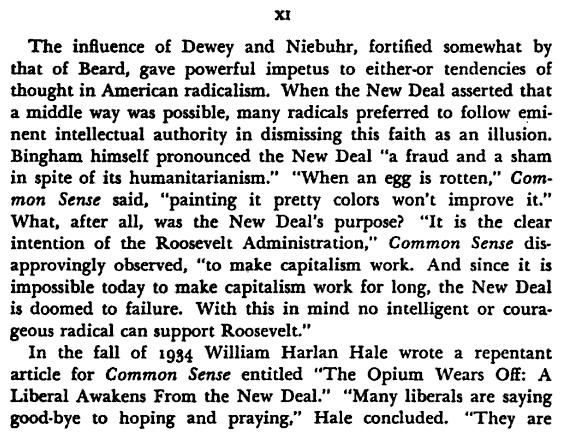Barack Obama
In reply to the discussion: One Helluva Post (Reposted as a Challenge for BOG Members to Add More to It) [View all]freshwest
(53,661 posts)While the New Deal did much to lessen the worst affects of the Great Depression, its measures were not sweeping enough to restore the nation to full employment. Critics of FDR's policies, on both the right and the left, use this fact as a reason to condemn it. Conservatives argue, for example, that it went too far, and brought too much government intervention in the economy, while those on the left argue that it did not go far enough, and that in order to be truly effective, the Roosevelt Administration should have engaged in a far more comprehensive program of direct federal aid to the poor and unemployed. But the New Deal's greatest achievements transcend mere economic statistics, for in a world where democracy was under siege, and the exponents of fascism and communism flourished, the New Deal offered hope and restored the faith of the American people in their representative institutions. It also transformed the federal government into an active instrument of social justice and established a network of laws and institutions designed to protect the American economy from the worst excesses of liberal capitalism.
http://www.rooseveltinstitute.org/policy-and-ideasroosevelt-historyfdr/new-deal



http://books.google.com/books?id=vC5HJloBWugC&lpg=PP1&pg=PA159#v=onepage&q&f=false
Report: Wall Street’s Opposition to Dodd-Frank Reforms Echoes Its Resistance to New Deal Financial Safeguards
Bedrock Consumer Protections Once Were Flogged as ‘Exceedingly Dangerous,’ ‘Monstrous Systems’ That Would ‘Cripple’ the Economy
WASHINGTON, D.C. – As the nation approaches the first anniversary of the Dodd-Frank financial reform law, opponents are claiming that the new measure is extraordinarily damaging, especially to Main Street. But industry’s alarmist rhetoric bears striking resemblance to the last time it faced sweeping new safeguards: during the New Deal reforms. The parallels between the language used both then and now are detailed in a report released today by Public Citizen and the Cry Wolf Project.
In the decades since the Great Depression, Americans acknowledged the necessity of having safeguards in place to prevent another crash of the financial markets, including the creation of the Federal Deposit Insurance Corporation (FDIC) and the Securities and Exchange Commission (SEC), and laws requiring public companies to accurately disclose their financial affairs. Although these are now seen as bedrock protections when they were first introduced, Wall Street cried foul, the new report, “Industry Repeats Itself: The Financial Reform Fight,” found.
“The business community’s wildly inaccurate forecasts about the New Deal reforms devalue the credibility of the ominous predictions they are making today,” said Taylor Lincoln, research director of Public Citizen’s Congress Watch division and author of the report. “If history comes close to repeating itself, industry is going to look very silly for its hand-wringing over Dodd-Frank when people look back...”
In fact, the Dodd-Frank Wall Street Reform and Consumer Protection Act is designed to prevent another Wall Street crash, which really made it tough on everyone by causing massive job loss and severely hurting corner butchers and bakers, as well as retirees, families with mortgages and others. The Dodd-Frank law increases transparency (particularly in derivatives markets); creates a new Consumer Financial Protection Bureau to ensure that consumers receive straightforward information about financial products and to police abusive practices; improves corporate governance; increases capital requirements for banks; deters particularly large financial institutions from providing incentives for employees to take undue risks; and gives the government the ability to take failed investment institutions into receivership, similar to the FDIC’s authority regarding commercial banks. Much of it has yet to be implemented...
http://www.commondreams.org/newswire/2011/07/12-0
Elizabeth Warren:
There is no question that Dodd-Frank was a strong bill—the strongest in three generations. I didn’t have a chance to vote for it because I wasn’t yet in the Senate, but if I could have, I would have voted for it twice.
http://www.warren.senate.gov/files/documents/AFR%20Roosevelt%20Institute%20Speech%202013-11-12.pdf
http://www.democraticunderground.com/10024656032#post1
ProSense's sigline:
...the American story is one of perfectibility and striving for ever-greater fidelity to our ideals -- it is a journey from colony to republic, from slavery to freedom, from sexism to suffrage, from stark poverty to shared prosperity.